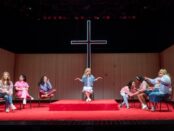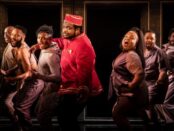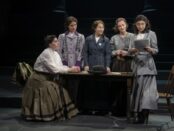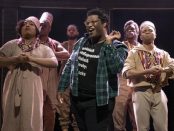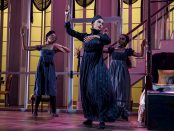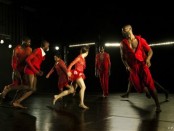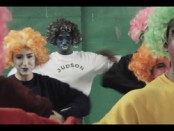Raja Feather Kelly
Choreographer/Director Raja Feather Kelly is the artistic director of New Brooklyn Theatre. In 2009, he founded the dance-theatre-media company the feath3r theory. The two companies merged in 2018. Raja has been awarded a Creative Capital Award (2019), a Breakout Award from the Stage Directors and Choreographers Foundation (2018), Dance Magazine’s inaugural Harkness Promise Award (2018), the Solange MacArthur Award for New Choreography (2016), and, twice, the Princess Grace Award (2017, 2018). He was born in Fort Hood, Texas and holds a B.A. in Dance and English from Connecticut College.
Raja Feather Kelly, an award-winning choreographer of recent Broadway musicals "A Strange Loop" and "Lempicka," as well as "Teeth," the recent Playwrights Horizons success imminently getting a commercial Off-Broadway run, makes his debut as a playwright with "The Fires," a work drenched in sorrow. The play examines three, actually four, Black men who inhabit the same third floor South Brooklyn railroad apartment in vastly different eras: 1974, 1998 and 2021. [more]
Lempicka
In telling the life story of Tamara de Lempicka, the show begins with a fascinating premise. Unfortunately, neither the score nor the book lives up to her high standards. Unlike "Sunday in the Park with George" which showed us the workings of the artistic process, "Lempicka" is more interested in the social aspects of the 1920’s and 1930’s Paris than in Tamara’s revolutionary paintings. The cast works hard to put over the new musical but they are defeated by commonplace situations, banal song lyrics, and over-used pronouncements. The musical of Tamara de Lempicka’s life still has to be told. [more]
Teeth
Sarah Benson’s direction is spot-on, but we find ourselves wishing the closing scene was more than just a plethora of bloody penises. This is where the creatives needed to say, “Okay, this is probably not what we wanted to say”. Adam Rigg’s scenic design though spare, is perfect for a mid-America room that can pass as a small church, or AA meeting. The neon cross is a great touch and Jane Cox and Stacey Derosier’s changing colors do not go unnoticed…particularly when the cross is pink amidst a lavender wash when Ryan is in the scene. Enver Chakartash’s costume design is appropriate across the board, although the women’s outfits in the closing scene are a mélange of Tina Turner’s castoffs from "Mad Max Beyond the Thunderdome." Choreographer Raja Feather Kelly provides fine ensemble suites for the Promise Keeper Girls. [more]
A Strange Loop
Deliriously and explicitly profane, Michael R. Jackson’s Pulitzer Prize winning musical, "A Strange Loop" has—unbelievably—made it to Broadway, produced by Playwrights Horizons, Page 73 and the Woolly Mammoth Theatre Company. Jackson’s explicit portrait of a lost soul’s salty journey is alternately stunning and amusing, appealing and appalling, told at a breakneck pace through his book, lyrics and music. It’s a rare, if dispiriting, portrait of a gay man who isn’t a paragon, a man who isn’t conventionally handsome, successful or rich. [more]
Suffs
Unfortunately, while Wells (Nikki M. James) and Mary Church Terrell (Cassondra James), another renowned Black suffragist, occasionally pop up to offer intersectional insights, they mostly come across as an addendum to the all-female and nonbinary musical's Paul-centric narrative. Taub knows Wells and Terrell obviously belong in the story she's trying to tell, but she hasn't figured out how to dramatize their inclusion yet. Other suffragists whose names should be much more well known today also receive paper-thin characterizations: Lucy Burns (Ally Bonino); Doris Stevens (Nadia Dandashi); Ruza Wenclawska (Hannah Cruz); Inez Milholland (Phillippa Soo). [more]
A Strange Loop
Twenty-five-year-old African-American Michigan native and New York University graduate Usher is an usher at a Disney Broadway musical who is writing an autobiographical musical about his troubled life. His religious Christian parents are scornful of his sexuality and dubious of his career goals as he doesn’t emulate the commercial simplisticness of Tyler Perry who gets skewered in a production number. This exploration is light on plot and so we get a series a of overheated vignettes often laden with wan shock value. The often didactic dialogue relies on scatology peppered with the N-word. Dark comedy crossed with poignancy abounds. [more]
If Pretty Hurts Ugly Must Be a Muhfucka
Dynamically presented and sensationally performed, "If Pretty Hurts Ugly Must Be a Muhfucka" is playwright Tori Sampson's maddeningly overblown adaptation of a fable with music. A surfeit of extraneous devices and a heavy-handed agenda overwhelm and drag out a tender and potentially resonant tale. There’s repetitive jokiness, a lumbering ghostly gospel sequence and an anti-climactic pretentious finale. Amidst the frustrating tangents are bright spots during a straight through nearly two hour [more]
The House That Will Not Stand
Gardley makes use of a little known piece of American history: while Louisiana was under Spanish and later French rule, it had a three-tiered racial system. Aside from white settlers and black slaves, there was a third class: free women of color (mostly Creoles) could enter into a relationship with white men as common-law wives. Their children could inherit part of their estates. Some of these so-called “colored” women became extremely rich. This system was called plaçage and such women were known as placeés. The lighter the woman’s skin color the higher her social caste. However, when Louisiana was sold to the new United States in 1803, this system was frowned upon and eventually went out of style around 1813 due to legal challenges. [more]
Fairview
Jackie Sibblies Drury is a unique new voice in the American theater. Her use of metatheater is all her own. "Fairview" has a great deal to say about race in America and the angle you see things from and she is able to cleverly shift it from scene to scene. However, this new play is a bit too long for its content, with scenes overstaying their welcome. Nevertheless, Drury is a playwright well worth watching. [more]
American Dance Platform: Fist and Heel Performance Group & Martha Graham Dance Company
Reggie Wilson has been combining dance and cultural anthropology for many years. His troupe, Fist & Heel Performance Group, is a living testament to his passion with “Moses(es), Moses(es),” his full-company work, a living and breathing example of his philosophy. In his program notes, Mr. Wilson explained that this work was based on “the many iterations of Moses in religious texts, and in mythical, canonical and ethnographic imaginations,” a big subject that, unfortunately, doesn’t lend itself to a dance interpretation. In fact, Mr. Wilson’s description, not withstanding, it would be difficult to find any reference to that Jewish Biblical giant in “Moses(es), Moses(es),” except when the entire company sang a song whose only word was “Moses.” [more]
Interview with Raja Feather Kelly
Raja Feather Kelly TheaterScene.net had the pleasure of interviewing Raja Feather Kelly, the [more]



